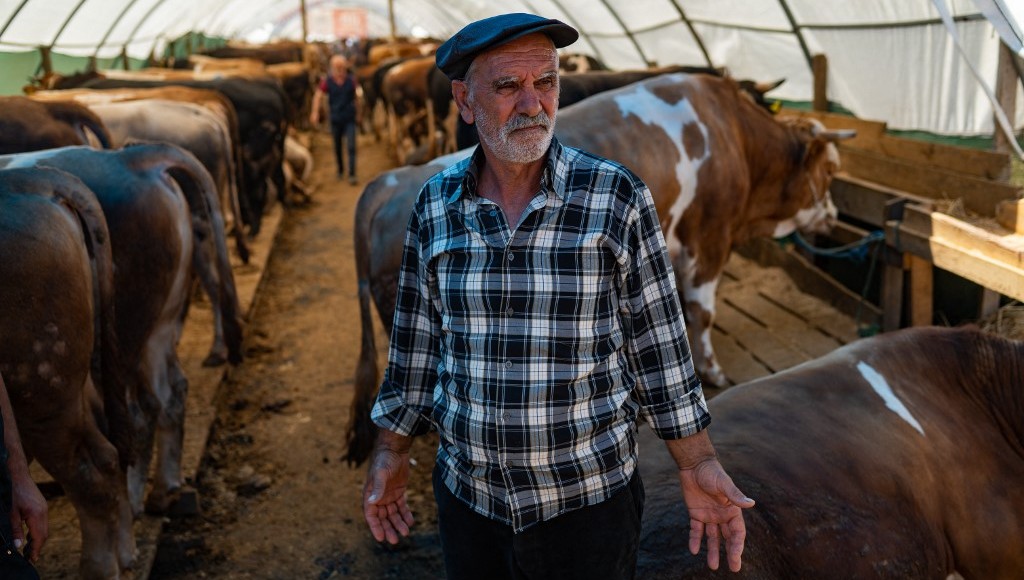Turkish families are struggling financially to perform the traditional Eid al-Adha sacrifice of animals since high inflation has made it increasingly difficult for local farmers to sell and citizens to buy animals at affordable prices.
Eid al-Adha, commonly translated as the Feast of Sacrifice, is one of the two main Islamic holidays during which the ritual sacrifice of animals such as cattle or sheep is performed by those who are able to afford it. Some of the meat of the animals sacrificed during the feast is distributed to family, friends and charities. Eid al-Adha will be celebrated by Muslims between June 16 and 19.
Rising prices have left both farmers and people who want to sacrifice an animal during Eid al-Adha in a difficult situation. Many farmers in Turkey say they have been able to sell far fewer animals for sacrifice than last year, complaining about the rising cost of raising animals, which affects their prices significantly.
Turks have been suffering from skyrocketing inflation for several years, surging to 85 percent in October 2022.
In May inflation stood at 75.4 percent, according to Turkey’s statistical authority, the Turkish Statistical Institute (TurkStat), but calculations of ENAG, an independent group of economists, suggested that it was in fact 120.7 percent, much higher than the official figure.
The high rate of inflation makes it difficult for Turks to meet even their basic needs.
According to Turkish media reports, cattle prices increased by 238 percent in the capital of Ankara compared to last year, reaching TL 220,000 ($6,811), while sheep prices saw an increase of 300 percent, with prices varying between TL 15,000 ($464) and TL 20,000 ($619).
Nationalist İYİ (Good) Party vice chair and lawmaker Hakan Şeref Olgun told Turkish media on Wednesday that it has become “impossible” due to economic conditions for Turks to be able to sacrifice animals over the holiday.
“Not only our low-income citizens but also our middle-income citizens have difficulty in buying sacrificial animals now,” the MP said, adding that the TL 3,000 ($92) that the state distributes to pensioners as an Eid bonus only allows them to buy a quarter of a small steer.
Meat imports as a solution?
Ömer Fethi Gürer, a member of the Turkish parliament from the main opposition Republican People’s Party (CHP) who met with farmers in Niğde to discuss the price of livestock, the rising costs of animal husbandry and the challenges faced by the sector, talked about a significant drop in the sale of sacrificial animals this year, according to local media.
There has been a 10 to 20 percent drop in small cattle sales and a 30 to 40 percent drop in large cattle sales compared to last year, Gürer was told by the farmers.
He said the Turkish government is importing meat from foreign countries to make meat affordable for the people but that this is not a long-term solution.
Recalling that a million imported animals entered Turkey between 2023 and 2024, Gürer said the problem of a lack of affordable meat should be addressed domestically, warning that problems will escalate if the surge in the costs of animal husbandry is not addressed and domestic farmers are not supported by the government.
Baki Remzi Suiçmez, president of the Chamber of Agricultural Engineers, shared Gürer’s concerns. He told the Artı Gerçek news website that the government should reduce its dependence on the import of meat, which began in 2010 and has continued over the years, and address the farmers’ feed costs to solve the problem of increasing red meat prices.
Over the past several years Turkey has been suffering from a deteriorating economy, with high inflation and unemployment, as well as a poor human rights record. President Recep Tayyip Erdoğan is criticized for mishandling the economy, emptying the state’s coffers and establishing one-man rule in the country which are said to have contribute to the country’s economic decline.

